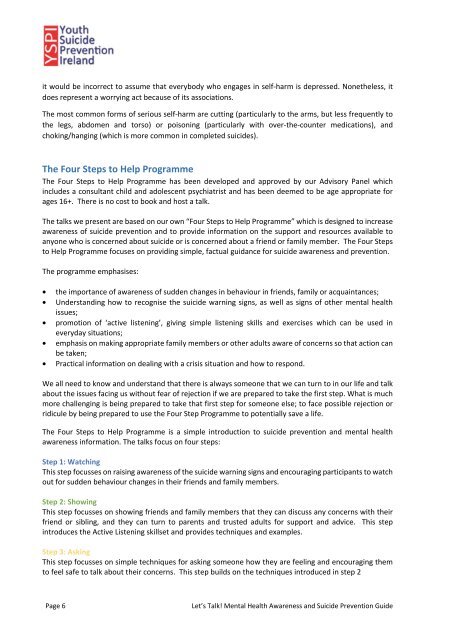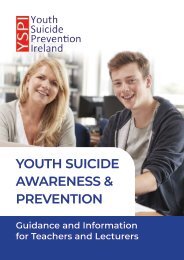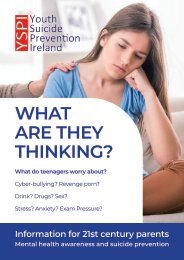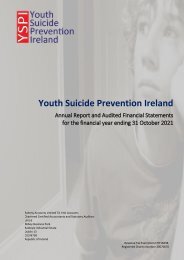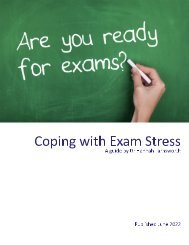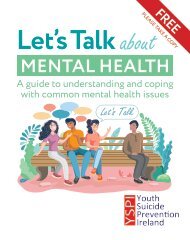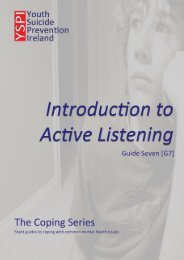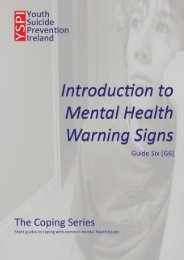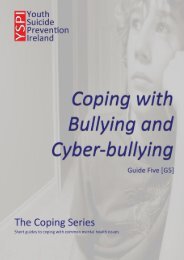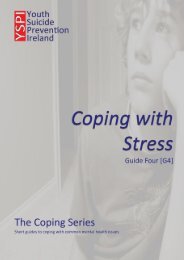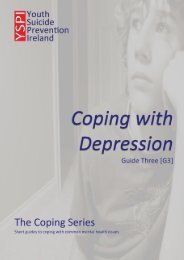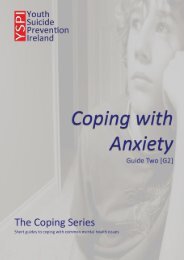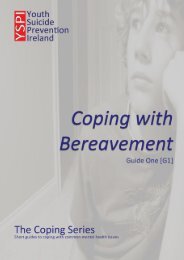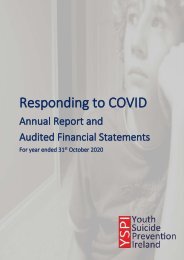Let's Talk Guide 2021
A new guide to mental health awareness and suicide prevention.
A new guide to mental health awareness and suicide prevention.
- No tags were found...
You also want an ePaper? Increase the reach of your titles
YUMPU automatically turns print PDFs into web optimized ePapers that Google loves.
it would be incorrect to assume that everybody who engages in self-harm is depressed. Nonetheless, it<br />
does represent a worrying act because of its associations.<br />
The most common forms of serious self-harm are cutting (particularly to the arms, but less frequently to<br />
the legs, abdomen and torso) or poisoning (particularly with over-the-counter medications), and<br />
choking/hanging (which is more common in completed suicides).<br />
The Four Steps to Help Programme<br />
The Four Steps to Help Programme has been developed and approved by our Advisory Panel which<br />
includes a consultant child and adolescent psychiatrist and has been deemed to be age appropriate for<br />
ages 16+. There is no cost to book and host a talk.<br />
The talks we present are based on our own “Four Steps to Help Programme” which is designed to increase<br />
awareness of suicide prevention and to provide information on the support and resources available to<br />
anyone who is concerned about suicide or is concerned about a friend or family member. The Four Steps<br />
to Help Programme focuses on providing simple, factual guidance for suicide awareness and prevention.<br />
The programme emphasises:<br />
• the importance of awareness of sudden changes in behaviour in friends, family or acquaintances;<br />
• Understanding how to recognise the suicide warning signs, as well as signs of other mental health<br />
issues;<br />
• promotion of ‘active listening’, giving simple listening skills and exercises which can be used in<br />
everyday situations;<br />
• emphasis on making appropriate family members or other adults aware of concerns so that action can<br />
be taken;<br />
• Practical information on dealing with a crisis situation and how to respond.<br />
We all need to know and understand that there is always someone that we can turn to in our life and talk<br />
about the issues facing us without fear of rejection if we are prepared to take the first step. What is much<br />
more challenging is being prepared to take that first step for someone else; to face possible rejection or<br />
ridicule by being prepared to use the Four Step Programme to potentially save a life.<br />
The Four Steps to Help Programme is a simple introduction to suicide prevention and mental health<br />
awareness information. The talks focus on four steps:<br />
Step 1: Watching<br />
This step focusses on raising awareness of the suicide warning signs and encouraging participants to watch<br />
out for sudden behaviour changes in their friends and family members.<br />
Step 2: Showing<br />
This step focusses on showing friends and family members that they can discuss any concerns with their<br />
friend or sibling, and they can turn to parents and trusted adults for support and advice. This step<br />
introduces the Active Listening skillset and provides techniques and examples.<br />
Step 3: Asking<br />
This step focusses on simple techniques for asking someone how they are feeling and encouraging them<br />
to feel safe to talk about their concerns. This step builds on the techniques introduced in step 2<br />
Page 6<br />
Let’s <strong>Talk</strong>! Mental Health Awareness and Suicide Prevention <strong>Guide</strong>


